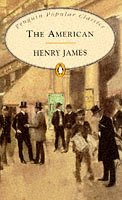James, Henry "The American" - 1875
1875, towards the end of the 19th century, society thinks it has become more modern. But has it really? A rich American moves to Europe where he meets a French woman and they fall in love. But the class difference stands between them, his money does not make up for a snobbery that has been cultivated for centuries. Social traditions are so important to her family.
I love reading about the different kind of world in the past, especially if it was written from a contemporary point of view. Henry James is the American Jane Austen, he points out all the problems society had at the time without being able to show a solution, even a glimmer of hope because he couldn't see it from where he stood.
I especially like the style of writing these authors employed. It's a pleasure to read, even if it was just for the words and not the story. But the plot is quite interesting, too. Good book.
"In this classic collision of the New World with Old Europe, James weaves a fable of thwarted desire that shifts between comedy, tragedy, romance, and melodrama."
See more comments on my ThrowbackThursday post in 2025.
From the back cover:
"'You, you a nun; you with your beauty defaced and your nature wasted you behind locks and bars! Never, never, if I can prevent it!'
A wealthy American man of business descends on Europe in search of a wife to make his fortune complete. In Paris Christopher Newman is introduced to Claire de Cintre, daughter of the ancient House of Bellegarde, and to Valentin, her charming young brother. His bid for Claire's hand receives an icy welcome from the heads of the family, an elder brother and their formidable mother, the old Marquise. Can they stomach his manners for the sake of his dollars? Out of this classic collision between the old world and the new, James weaves a fable of thwarted desire that shifts between comedy, tragedy, romance and melodrama a fable which in the later version printed here takes on some of the subtleties associated with this greatest novels."
1875, towards the end of the 19th century, society thinks it has become more modern. But has it really? A rich American moves to Europe where he meets a French woman and they fall in love. But the class difference stands between them, his money does not make up for a snobbery that has been cultivated for centuries. Social traditions are so important to her family.
I love reading about the different kind of world in the past, especially if it was written from a contemporary point of view. Henry James is the American Jane Austen, he points out all the problems society had at the time without being able to show a solution, even a glimmer of hope because he couldn't see it from where he stood.
I especially like the style of writing these authors employed. It's a pleasure to read, even if it was just for the words and not the story. But the plot is quite interesting, too. Good book.
"In this classic collision of the New World with Old Europe, James weaves a fable of thwarted desire that shifts between comedy, tragedy, romance, and melodrama."
See more comments on my ThrowbackThursday post in 2025.
From the back cover:
"'You, you a nun; you with your beauty defaced and your nature wasted you behind locks and bars! Never, never, if I can prevent it!'
A wealthy American man of business descends on Europe in search of a wife to make his fortune complete. In Paris Christopher Newman is introduced to Claire de Cintre, daughter of the ancient House of Bellegarde, and to Valentin, her charming young brother. His bid for Claire's hand receives an icy welcome from the heads of the family, an elder brother and their formidable mother, the old Marquise. Can they stomach his manners for the sake of his dollars? Out of this classic collision between the old world and the new, James weaves a fable of thwarted desire that shifts between comedy, tragedy, romance and melodrama a fable which in the later version printed here takes on some of the subtleties associated with this greatest novels."






